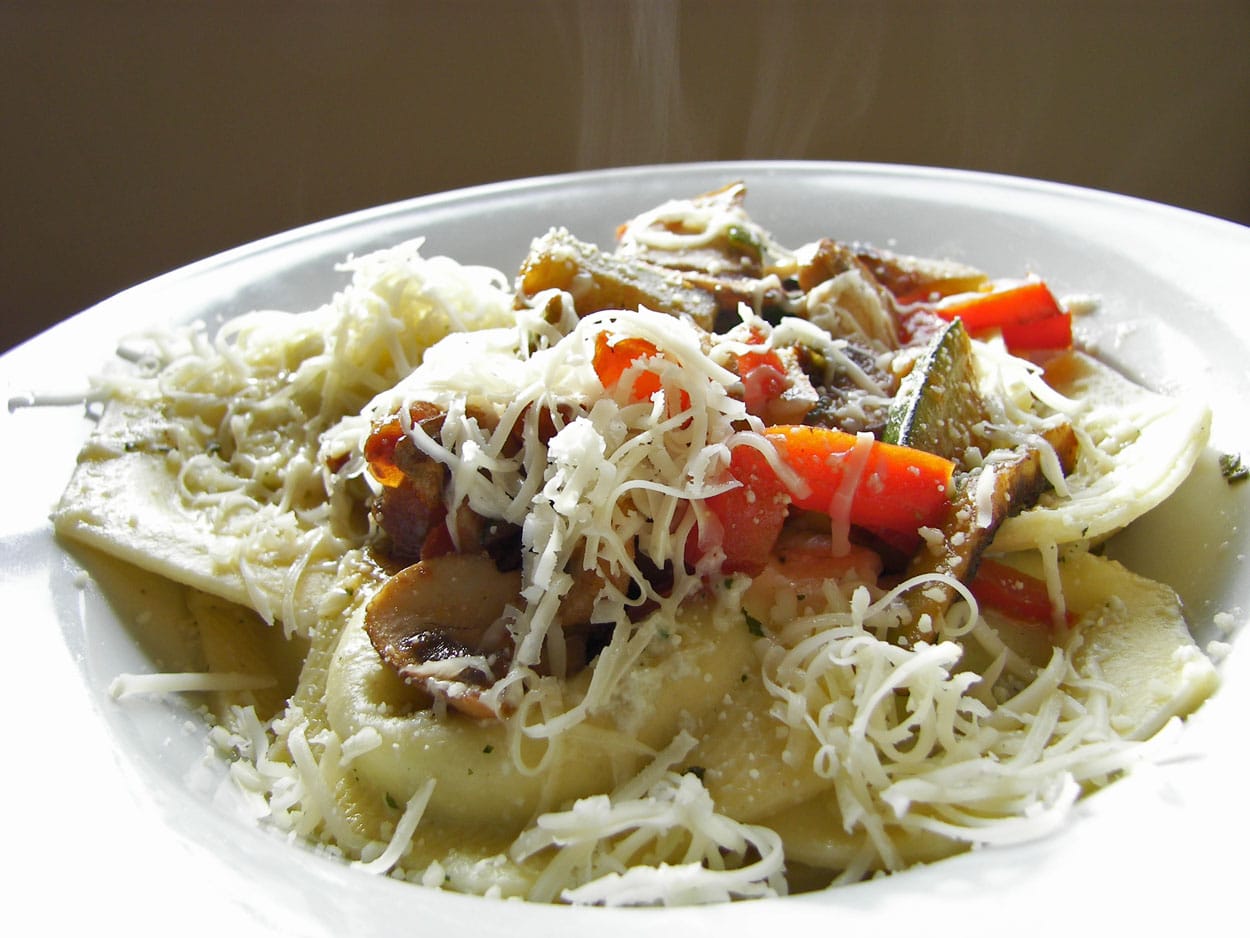It’s the Top – Banking on Swiss Cuisine
Fondue, raclette, and cured, air-dried meats … to outsiders Switzerland might seem to be a backwater place when it comes to culinary matters. Way off the mark because it’s not just about the meat and the cheese. In terms of quality, value, and consistency, only Japan can compare.
Swiss cities are vibrant centers of both old and new gastronomical excellence. Due to their affluence, the Swiss can afford to buy the best. For the same reason, the Swiss travel frequently around the globe and return with knowledge of the finest cuisines, both west and east. These days you are more likely to find better Italian restaurants in Switzerland than in Italy, like Ristorante Italia in Zurich, Ristorante Scala in Bern and Gatti’s in Basel. The superiority of these establishments to most others in their home country is not only due to the influence of the Ticino, the Italian speaking region, but also to greater governmental controls over products. Swiss ingredients are often fresher, subject to reliable and honest inspection, and prepared under the watchful eyes of Italian chefs who traveled north to get away from corruption.
A recent scandal broke out in Rome when it was revealed that a number of top restaurants were helmed by folks from nations other than Italy. The food? Italian as interpreted by a cook from Istanbul or Dakar. It wasn’t xenophobia. The question asked was whether Italian food could be prepared by someone lacking the Italian home cooking traditions.
The same goes for French dining in Switzerland. In French speaking Switzerland there is a long tradition handed down over generations in some of the world’s finest restaurants along the shore of Lake Geneva where cascading vineyards go down to its shores. The most famous chef in the world was Swiss: Fredy Giradet, who went on to inspire Swiss chefs Gray Kunz and Philippe Rochat. Chef Rochat, who runs Restaurant de L’Hôtel de Ville in Crissier, pays almost fastidious attention to detail, is willing to pay top prices (like the equivalent of $5 for one asparagus spear), and takes a seasonal approach to ingredients that are as refined as the best three star Michelin restaurants in France.
Alongside Chef Rochat, and standing tall as one of the best chefs in Europe, is Philippe Chevrie, who is cooking at the Relais & Chateaux property, Domaine de Châteauvieux in Satigny, Switzerland’s largest wine growing municipality. Here, in a fairy tale setting, surrounded by vineyards, long evenings of brilliant tasting menus are accentuated by the finest Swiss wines.
The revolution in Swiss dining is not confined to the food. Just under ten years ago a generation of winemakers, chiefly along Lake Geneva, decided to create wines to rival Burgundy, Napa, and Piedmont. Using longer periods of barrel aging, longer cellaring, and lower yields, they are producing pinot noir and unique Swiss varietals like Heida and Chasselas, for example, with long finishes and subtler flavor notes than ever before. These are top wines for food pairing. If you haven’t heard about these spectacular wines perhaps it’s because 99% of them are consumed by the Swiss. Now and then the Swiss producers talk about selling their wines to the United States, but then they ask: why bother? It’s just as profitable for them to market them at home.
Enjoying Swiss wines, though, is not confined to expensive, high end restaurants. Wine bars are appearing throughout the country. The misconception is that Switzerland is about beer; it’s not. No nation consumes more wine per capita. In Lucerne the best wine bar is Opus. Here, along the River Reuss, you can sample and buy bottles from the best, young mavericks. In Zurich, Park Hyatt has a wine program that is simply nonpareil as well as very sophisticated.
Swiss wines are not the only examples of high quality. Switzerland has the largest percentage of organic products than any other nation: 13% compared to 4% in the E.U. and about 2% in the U.S. It’s not that organic food necessarily tastes better, but the control of the product is more systematic and, hence, reliable from season to season and year to year. The same goes for the AOC or “controlled designation of origin” that signifies where a product comes from. The Swiss are vigilant about the integrity of taste, convinced that where something is grown–its terroir–must be expressed and sustained. Of course, the French and the Italians share this desire. The difference is that Switzerland has the money, infrastructure and size to organize and implement standards.
As a result, even traditional Swiss restaurants, informed by a farm to table philosophy, are spectacular these days. Next to one of the top restaurants in Zurich, Kronenhalle, you’ll find the Vorderer Sternen Grill which is outdoors and by the lake. Stand and enjoy delicious sausages and beer or wine as you eyeball the passersby. In Bern, an old granary has been converted into an upscale establishment called Kornhauskeller serving Swiss specialities that are light on the palate. In Vevey, which was home for Charlie Chaplin, Hotel des Trois Couronnes has a restaurant serving egli, a local lake fish that is lightly sautéed and accompanied by a Chasselas. It’s perfect.
When you’re not dining out in restaurants, head for the Swiss bakeries. Breads in Switzerland – hearty, coarse grained, and with great crusts -have no rivals. The sunflower seed breads are amazing.
But it’s not just its’ own traditions that finds expression in Swiss gastronomy these days. Thai, Japanese, Sri Lankan, Turkish, and Indian restaurants with great depth have been appearing regularly in the past few years throughout Switzerland. Delicate flavors, top ingredients and authenticity make these places well worth visiting. Switzerland is a favorite location for Bollywood movies, for example, and on top of the Jungfrau you’ll find the aptly named Indian restaurant called Bollywood. In Bern, you’ll find Nooch Noodles & Sushi and also inside Markthalle, a large food hall near the train station, you have a wide choice of Southeast Asian restaurants. The best of these is Tanka Kehrstaz, a unique Swiss-Japanese restaurant.
So put down your fondue fork, pick up your chopsticks, raise a glass of Swiss pinot noir and say Bon Appetit in Swiss: En guete!
{niftybox=600}
Eating Around Switzerland
Ristorante Italia (www.ristorante-italia.ch)
Zeughausstrasse 61
Zurich
Tel. 043 233 88 44
Ristorante Scala (www.ristorante-scala.ch)
Rotbuchsstrasse 1
Zurich
Tel. 044 363 85 50
Gatti’s (www.gattis-ch)
Kirchgasse 4
Arlesheim (Basel)
Tel. 061 701 75 69
Restaurant de L’Hôtel de Ville
1 Rue d’Yverdon
1023 Crissier
Tel. 41 (0)21 634 05 05
Opus
Bahnhofstrasse 16
Luzern
Tel. 041 226 41 41
Kronenhalle
Rämistrasse 4
Zurich
Tel. 044 262 99 00
Vorderer Sternen Grill
Theaterstrasse 22
Zurich
Tel. 41 44 251 49
Kornhauskeller (www.kornhauskeller.ch)
Kornhausplatz 18
Bern
Tel. 031 327 72 72
Hotel des Trois Couronnes
49 rue d’Italie
Vevey
Tel. 41 21 923 32
Bollywood
On top of the Jungfrau
Tel. 41 33 828 78 88
Nooch Noodles & Sushi
Heinrichstrasse 267
Zurich
Tel. 41 (0) 43 366 85 35
Markthalle
Breitenrainstrasse 22
Bern
Tel. 031 329 29 90
Tanka-Kehrstaz
Bernstrasse 70
Bern
Tel. 41-31-961-6622
{/niftybox}

